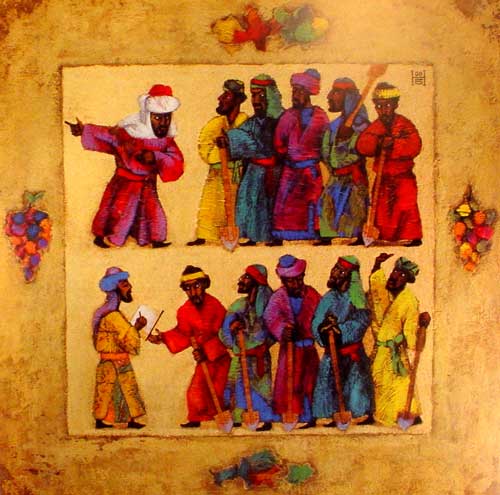


"The Workers in the Vineyard" by Kazakhstan Artist Nelly Bube.



Ylvisaker: This parable presents many difficulties, and there is an almost endless array of interpretations. But the greatest obstacles result from a disregard of the conception which underlies the structure of this parable, which is indicated, however, by the Saviour Himself both at the beginning and at its close.
True. In general, Lenski's interpretation is not recommended. Hendriksen rightly takes Lenski to task on a number of points. Lenski obscures the point of comparison by allegorizing.
Before you begin work on this text, carefully read 19:16-30. A rich young man approached Jesus. His self righteousness is very apparent in verse 20. But his total lack of understanding of salvation by grace through faith is also very apparent in verse 21. His riches meant everything to him. And he did not want to use his money in the interest of others. Therefore he left in sorrow (verse 22).
Jesus' observation in verses 23-24 applies not only to the wealthy but also to the poor who trust in riches and things to the exclusion of the righteousness of God by faith in Christ. In verse 25 the disciples ask "Who, then, can be saved?" The "who" includes themselves. They are astounded. And so are we. The words of Jesus in 23-24 are stark Law. The flesh loves to trust in things, money, self. Jesus' answer in verse 26 covers all instances.
Salvation is impossible with men and possible only with God, for with Him ALL things, even the salvation of the soul, are possible. The salvation of the individual soul is a mighty and gracious act of God.
In verse 27 Peter makes a statement and then asks a question. In both he is comparing himself and the disciples with the rich young man who had just left in sorrow. "What, then, shall be to US?"
Jesus' answer in verses 28-29 is a remarkable promise. He is speaking of true followers of Jesus. "At the renewal of all things," unlike Titus 3:5, is eschatological, when there will be the new heaven and the new earth (Revelation 21:1).
The words "for my name's sake" in verse 29 are very important. Not for his own sake, but for Jesus' sake, which denotes true repentance and faith as opposed to the selfishness and work righteousness of the rich young man.
The words "immeasurably more," applies both to this life, but especially to eternal life, as Jesus plainly states, but it is by inheritance, which means that it is not earned.
Then comes the warning in verse 30: "Many first will be last and last first." Peter's statement and question in verse 27 is fraught with danger. When we compare ourselves with others, the flesh becomes active and self righteous thoughts influence our thinking. Look at Galatians 6:1-5, especially verses 3-5. By testing himself constantly, and that immediately involves contrition over sin, and by trusting in the merits of Christ alone, the Christian will have boasting in himself alone BUT NOT TOWARD ANOTHER PERSON.
Then follows verse 5: "You see, each one will bear his own burden," the responsible burden of repentance and faith.
Matthew 19:30 is both warning and promise. The "first" are like the rich young man, Peter, and all who in their self righteousness, consider themselves better than others. The "last" listen to verse 26, do not murmur in envy and jealousy, speak as did the publican in Luke 18:13, listen to 2 Corinthians 12:9, and, therefore, by the grace of God in Christ are considered "first."
And now follows the parable of the laborers in the vineyard, an elucidation of Matthew 19:30, which is restated at 20:16.
In order to avoid the so-called difficulties of this parable and to keep from getting entangled in what Ylvisaker calls "the endless array of interpretations," it is suggested that the preacher first read the parable at Luke 17:7-10. Jesus Himself explains. Even if we would do everything that He has commanded (and we don't), we must declare ourselves unprofitable servants. We've only done our duty, what God rightly demands, and which doing is not meritorious.
It is also suggested that the preacher read hymn #373 in The Lutheran Hymnal.
Now back to verse 1. The chapter division obscures the fact that the "you see" points back immediately to verse 30. The whole parable explains that one sentence.
"The Kingdom of Heaven" here is the Kingdom of grace, the visible church on earth, which will be consummated in the Kingdom of glory, verse 8. It must be stated here that Jesus is not speaking of the kingdom of power. All ideas of labor and management or of capital and labor must be laid aside. Jesus is plainly speaking of how He deals with members of the church, among whom are hypocrites.
"A landowner, the owner of an estate, the owner of a vineyard." "Who went out at dawn to hire workers for his vineyard" shows that he, and he alone, took the initiative. Synergism is eliminated.
These notes do not agree with those interpreters who say that this verse clearly shows the mercenary spirit of those hired. It merely stresses the fact that the workers clearly understood the arrangement.
"Sent" as always, means "to send with a commission." It must be stressed that, at this point, the workers do not object or murmur as they do later. In application the word "denarius" means the same as 19:21 and 29b: "immeasurably more and will inherit eternal life." In application, a "denarius" denotes God's abundant and generous grace. In Greek a "denarius" denotes a day's wage but the application is quite different. Jesus said: "The Kingdom of heaven is like" not "the same.."
Another group is engaged at 9 am. The point of this verse is that the landowner alone takes the initiative. They were idle, unoccupied. Like today when people do nothing but sit around in a pool-hall or a tavern, completely unoccupied. Synergism is eliminated.
The first part of this verse again shows that the landowner takes the initiative. The last part of the verse clearly shows the justice of the wage. In form it is a conditional relative sentence , assuring them that they will not be cheated.
They complied immediately. Then the landowner again takes the initiative and hires idle people at noon and at three pm.
This verse introduces an element of utter surprise. The landowner takes the initiative and hires men at about five pm, unheard of, and purposely so, for Jesus is speaking about the Kingdom of Heaven, the Kingdom of grace on earth.
Note juxtaposition of subject and object "Nobody us has hired." This answer does not denote irreverence but simply brings out their helplessness. But the landowner, in his utter generosity, takes the initiative, engages their services. The variant "And whatever is just, you will receive," is implicit in this verse.
The first three words are a genitive absolute denoting time.
Bengel: A prophetic allusion is made to the Last Judgment. The evening of each individual's life resembles the evening of the world.
Jesus is beginning to make application. "Owner" is variously translated as "steward, foreman, manager, paymaster and bailiff." These notes do not recommend that "owner" denote the Father, and "foreman" the Son. As Hendriksen points out, the "foreman" is mentioned only here. The point is rather that the "owner" is quite wealthy and that all do his bidding.
"Call the workers and pay the wage that is due them" means that the will of the owner is supreme and that he alone takes the initiative.
"Beginning from the last to the first" is wholly unexpected. In the kingdom of power, under the ordinary circumstances of labor and management, this would be unheard of and unfair.
Fahling: This was a necessary part of the parable, because, as afterwards appears, here is where the complications begin. The order was strange, but still stranger was the payment.
Stoeckhardt: Ordinarily employers pay their workers according to the services rendered. . . . But the owner of the vineyard did not follow this rule.
Hendriksen: Clearly this surprising order is in harmony with the rule laid down in 19:30 and 20:16, the last are going to be first, and the first last.
This is Law, not Gospel. The flesh responds to this order by saying: "Lord, that is unfair!" Faith in Christ responds by saying: "By grace I'm saved, grace free and boundless!"
From this point on the parable dwells deliberately only on the last and the first. Note that verses 9 and 10 begin in the same way. They did not come forward until they were called, which, in application denotes the Judgment. Note that the subjects in both verses 9 and 10 are elliptical, but maybe that is deliberately done. "The first" had been promised a definite wage. "Those about the eleventh hour" had simply been told to go into the vineyard. But both are treated exactly the same. "A denarius each."
It is remarkable that only the last and the first are stressed. Why, then, did Jesus, in the parable, mention also those hired at 9, 12 and 3, without mentioning them in application?
Fahling disposes of it by saying: "Nothing is said about the intermediates." Ylvisaker does not mention it.
Stoeckhardt: Others have remained idle many hours of the day, much of their life was wasted on vanity, and only later came to repentance, allowing themselves only a little time to show proofs of their repentance.
Bengel: The intermediate labourers did not murmur; for they saw themselves also made equal to the first. He who is liable to be envied himself, is less likely to envy others.
But that leaves something to be desired.
Hendriksen: Nothing is said about those who had been hired at 9, noon, and 3. We may assume that they are satisfied -- perhaps even more than satisfied -- with what they receive. But they are no longer mentioned.
Lenski: It was not necessary to bring in the other three groups. In a case such as this the most obvious is chosen.
Perhaps Jesus added the three intermediate groups to complete the illustration, but not to be stressed in application. That may not satisfy, but it's the best we can do.
"They expected" is variously translated "they supposed, they thought, they assumed." Does that mean that they were of this opinion. Or does it mean that they began thinking thus only when they compared themselves with others? There was full agreement when they were hired. They worked very hard. They did not murmur when hired.
Furthermore, does "expected to receive more" mean "more than those hired last" or "more than they had agreed upon"? We shall come to that in verses 11 and 12.
"After they had received " in both illustration and application, but the application in verse 14 spells out actually what they received. They began to grumble. Rather than being cheerfully grateful, they are grumblingly resentful. See Luke 5:30; John 6:41.43.61; 7:32 and 1 Corinthians 10: 10. We summarize: "Began to grumble" is used of the envious, the self righteous, the rejecters, and those who lose their souls. Never is it used of repentant sinners. In illustration the laborers begin grumbling only when they see that those hired last receive the same wage. In application this ought not be limited to Judgment Day. The instances of grumbling noted in the passages from Luke 5:20 to 1 Corinthians 10:10 are examples of grumblers in this life. What Jesus intends is for us to examine ourselves now, lest we lose our souls in the Great Judgment. He is warning Peter and all Christians about grumbling now.
Furthermore, the parable should not be applied literally only to people who have been Christians all their life as opposed to those who become Christians in their dying hour. He is speaking about an attitude, an attitude of self righteousness, of invidious comparisons, with other Christians.
The grumbling came out in their words. They despise "these last." "Equal to us you made them." This is stronger than saying: "Equal to them you made us."
The translations are interesting. Only AV and NKJV are the same. We list the others:
Life is not easy.
Bengel: 'Burden' internally, 'heat' externally.
And note that Jesus does not deny that. But He does deny subsequently that it is a basis for merit; for more pay, for envy of others.
Fahling: A man who insists upon right before God loses grace and receives judgment.
Ylvisaker: The person who is not satisfied, who comes in the spirit of pharisaic self righteousness, demanding his legal rights, will fall short of the reward.
Stoeckhardt: Among those who have worked the longest we find many proud and conceited persons, who rely on their long hours of work in the church and despise those who have worked but little, who insist on their rights, and are offended at the grace and goodness of God.
It is an ever-present danger. To demand more and better, annihilates the faith relationship. And to base it, furthermore, on one's own amount of work, suffering and toil, is disastrous.
Note that the master individualizes "to one of them." He addressed all but we must hear the Word individually.
Bengel: At first sight a friendly word but it assumes a more solemn aspect when we recollect that it is used in 22:12 to the guest who had not the wedding garment and in 26:50 by our Lord to Judas.
Lenski: This is a word of evil omen and points to 22:12 and 26:50.
"I treat you most generously." The assessment of the owner is utterly opposite that of the grumbler. The question demands the answer "yes." Assuming that our reading of the Greek is correct, for there are minor differences in the extant texts, this verse proves that the agreement in verse 2 was mutual. There can be no agreement unless it be mutual. This rhetorical question involves simple logic.
"Take yours and be gone!" denotes total rejection, damnation. In application it means that life eternal is lost.
Lenski: He is treated exactly as the hypocrites are who are mentioned in Matthew 6:2.5. They have received their reward.
In that passage Jesus says that the works of the hypocrites get an earthly reward, but there it stops. Is Jesus saying that here in 20:14? We leave it unanswered. "I will to give to this last one as also to you," meaning as a gift, based on grace, not on merit.
Bengel: The force of the word 'give' is very great, denoting the absolute freedom of God's grace. . . The expression 'to this last' is repeated from the speech of the murmurer, but used in the singular number and applied to the last of the last. Everyone who is envious, envies someone individually. The addition 'who has borne the burden and heat of the day' is not repeated.
Another question, demanding the answer "yes." This question implies that the murmurer was putting his own judgment above that of the owner. The translations are rightly unanimous in treating as neuter, "with my own money, with what is mine." This question implies that the murmurer arrogated to himself the position of owning and disbursing the money.
And now a third question. The first one (verse 13) was based on simple logic. The second (verse 15) was a question which demanded the right answer. This third question is the most searching and condemning of all. The translations are interesting.
The result is simply astounding. The generosity, kindness, grace and goodness of the owner causes them to be envious, to be hateful toward "the last." Nothing could be more perverted. The fault lies not with the grace of God, but wholly with the envious person.
Fahling: Since in the Lord's kingdom work is our duty and grace our reward, there should be neither envy in our hearts with respect to those who are received into the heavenly kingdom although they came to Christ only in the eleventh hour, while we have served Him all our lives, nor a gain seeking exhibition of our good works before God. The attainment of salvation is the same for both saint and sinner.
Ylvisaker: Many may have been true followers of Jesus, who shall likewise forfeit the eternal inheritance; they have not kept the grateful, humble, and childlike spirit which is mindful of its own unworthiness. They fell by the wayside, not in gross error and unbelief, but in the more subtle sin of self righteousness. Their position among men may have been an enviable one, they have been regarded, possibly, as lights or as examples for worthy emulation, now they are assigned to a place in the night of eternity. May God preserve us all in His grace!
Envy or jealousy, that is nurtured and not repented of, leads to eternal disaster.
Here Jesus makes application. "The last" are the enduring repentant sinners. "The first" are those, although knowing better, who fell prey to envy, unbelief, hypocrisy, and comparison with others. Peter was warned and so are we.